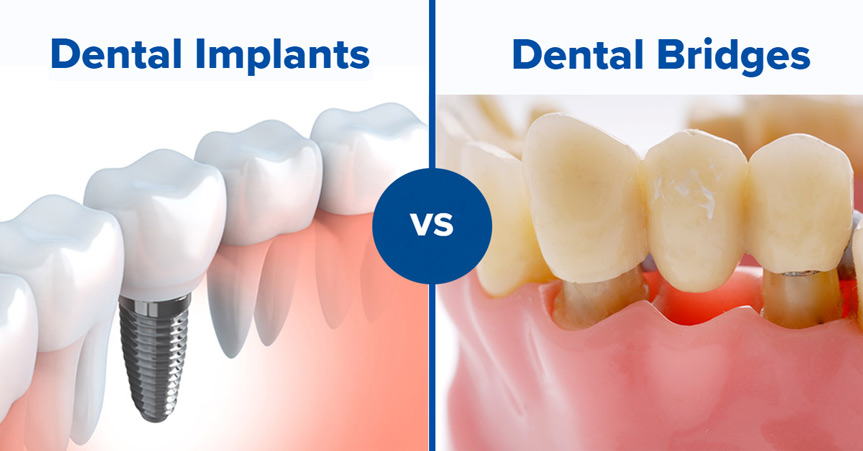When it comes to replacing missing teeth, dental implants and bridges are two of the most popular options. Both have their own advantages, and the right choice depends on your unique dental needs, health, and lifestyle. Understanding the differences between these two solutions can help you make a confident, informed decision with your dentist.
What Are Dental Implants?
Dental implants are artificial tooth roots made from titanium that are surgically placed into the jawbone. Once the implant fuses with the bone (a process called osseointegration), a crown is attached to give the appearance and function of a natural tooth. Implants are known for their durability and natural look. They can last a lifetime with proper care and do not rely on neighboring teeth for support.
Pros of Dental Implants:
- Long-lasting solution: With good hygiene, implants can last 20 years or more.
- Preserve jawbone health: Implants stimulate the jawbone, helping to prevent bone loss.
- Look and feel natural: They are designed to match your existing teeth.
- No impact on adjacent teeth: Unlike bridges, implants do not require grinding down neighboring teeth.
Cons of Dental Implants:
- Cost: They tend to be more expensive upfront.
- Time: The process can take several months from start to finish.
- Surgery: Implant placement involves a surgical procedure, which may not be suitable for everyone.
What Are Dental Bridges?
Dental bridges literally “bridge” the gap created by one or more missing teeth. A traditional bridge consists of one or more artificial teeth held in place by crowns cemented onto the adjacent natural teeth. Bridges can be made from porcelain, metal, or a combination of materials.
Pros of Dental Bridges:
- Quicker process: Most bridges can be completed in a few dental visits.
- Cost-effective: Generally less expensive than implants.
- No surgery required: A bridge can be placed without surgical procedures.
Cons of Dental Bridges:
- Shorter lifespan: Bridges typically last 5 to 15 years.
- Bone loss: They don’t prevent jawbone deterioration in the area of the missing tooth.
- Tooth damage: Healthy teeth next to the gap need to be shaved down for crowns, which may weaken them over time.
Which Is Right for You?
Choosing between implants and bridges depends on several factors, including your overall health, the number of missing teeth, your bone density, and your budget. If you’re in good health and looking for a long-term, low-maintenance solution, implants might be your best bet. On the other hand, if you’re looking for a quicker, more affordable fix and are not a candidate for surgery, a bridge could be the right choice.
Ultimately, the best way to decide is to consult with an experienced dentist who can assess your condition and help you weigh the pros and cons based on your specific case. For more personalized advice and dental care options, consider visiting doctorwisdom.com and scheduling a consultation with a dental professional.
No matter which route you take, restoring your smile is a big step toward improving your oral health and quality of life.…









